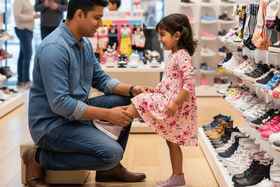12 Tips to Raising Independent Children
Updated June 10, 2025

Raising independent children is no easy feat. It is a complex amalgamation of restraint, love, understanding, support and discipline. Parents would easily just do everything for their children. But spoiling them, doing everything for them and preventing them from learning lessons they will need later in life will do more harm than good. To be independent, children must learn the values, the lessons and the hard work.
Here are some sensible tips to make your children more independent and self-sufficient:
- Teach them how to be independent – Start training your child how to be independent early on. Show them how to call you on the phone, encourage them to order their own meals at the restaurant, give them their own bag to carry and let them walk on their own whenever possible to instil the can-do attitude.
- Give them chores – Giving them chores is a good way to teach them basic tasks and the concept of responsibility. Start with light and manageable chores like feeding the dog, setting the table or cleaning their own rooms. You can teach older kids more complex chores like cooking simple meals, gardening or washing dishes. Teach them the most basic life skills they would surely need as they go into adulthood.
- Let them fail – Let them commit mistakes, make wrong decisions or pick wrong choices. Mistakes teach the best lessons on resilience, persistence and tenacity. A child who develops these core values is more likely to grow strong and independent.
- Forget perfection, focus on the lessons – Mistakes is just a tool to learn. It is alright to fail, make mistakes or miscalculate outcomes - we all have our successes and we have our learnings. Instead of focusing on the failure, highlight the lessons learnt, praise the effort and point out how they can do better next time.
- Let them realise the consequences of their actions – While it is unwise to hold them accountable for their mistakes, always let your children know the result of their actions. You can never recover spilt milk; it would be pointless to scold your child about it. Instead, let him or her recognise the reasons or the actions that caused the problem.
- Give yourself and your child some separation time – Set up a ‘separation’ time from your child. Being constantly together will not give him or her the chance to be independent. Toddlers can be left to play on their own (in a secure location), eat their meals or enjoy outings with other adults you trust. Children could be uncertain and upset with the idea at first, so you need to reassure them that you’ll be back and never too far.
- Parents are not their children’s slaves – Encourage your child to do things on his own. Show him how it’s done and let him do it. Give them the ‘if you want something, go for it’ attitude. Do not go around doing things for them. If they want a glass of water, they should get it themselves. If they want a pet, they should take care of it. Children are more independent and responsible when they learn that nobody will do the work for them.
- Watch from a distance – Always be watchful, but from a distance. As parents, we tend to hover over our children. Micromanage their activities, join in the games or be near our child as much as possible. As they start to explore the world outside of home, try to give them some space.
- Let them resolve issues – Do not try to resolve all issues your child encounters. Let him or her resolve petty fights with their siblings or friends, do tricky homework or finish unwanted chores. Life is full of challenges. Your child is going to face more serious problems in the future. Teach them the lesson that nobody is going to be there to help them out all the time and every time they up against a challenge.
- Be patient – Your child is still learning. Know that they will be slow in doing things and they will make mistakes. You might be tempted to do things yourself just to finish it faster or to make sure that it is done right. But you will not be doing your child a favour. You are only teaching him dependence.
- Give reassurance of your support – Your child should always be assured of your love, support and understanding. Give the assurance that you will love him no matter what and that you will always be there to help him out in case he fails. Let him know that failure doesn’t matter, only his learning is important.
- Be generous with your praise – Make sure to let them know they’ve done a good job or made the right decision. Regardless whether they’ve failed or succeeded, always put a good word in the effort they’ve put into it. That’s the best way you can encourage your child to repeat and make independent ways a habit.
Children are natural learners. They are eager to learn new things and takes pride in any accomplishments. They can be a little apprehensive too. But it is mostly due to the possibility of failure and of disappointing his or her parents. Eliminate that worry from your child. Instead, provide the encouragement he or she needs.
Give them the tools to be independent. Help your child feel in control. Children who think they can manage things are more likely to do it on their own. Give them tools that will help your child do tasks easily. It will vary and will be based on the age of the child. It can be easy-to-manage shoes for toddlers, a bicycle for a first grader, or a mobile for a teenager.
First Walkers offers a wide collection of specifically designed children’s shoes that cater to growing kids. Click here to check out our newest line of supportive shoes for kids from one-year-old pre-walkers to active school preteens.





